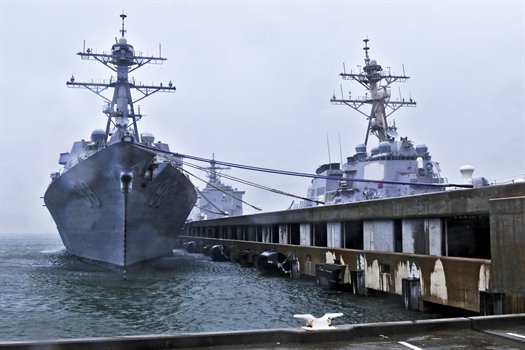
Event Recap: Emerging Global Threats: Effects of Climate Change on US Military Operations at Home and Abroad
ASP organized a trip to Raleigh, North Carolina to discuss the threats of climate change to US military operations. The day and a half of programming included interviews with some of the key media outlets in Raleigh and Durham and an event at the NC Museum of Natural Sciences in Raleigh, North Carolina. As the primary focus of the programming, the public event featured panelists, Brigadier General Stephen Cheney USMC (Ret) current CEO of ASP, and ASP Consensus Member, Dr. David Titley Rear Admiral, USN (Ret). The discussion was moderated by WRAL’s Greg Fishel and included a lively Q&A.
 Admiral Titley opened the event with an overview of the impacts of climate change on the military. First, climate change increases the frequency of extreme weather, resulting in the increased deployment of our troops to address humanitarian crises. The U.S. military is the only military in the world that has the capacity to respond to such large-scale humanitarian disasters. As climate change-related events intensify, this will leave our military stretched as they attempt to respond to disasters both at home and abroad. Climate change also impacts military infrastructure. Two examples of this can be seen in cold-environments like the Arctic and arid environments like Arizona. In the Arctic, permafrost is melting causing infrastructure to sink or collapse, and in Arizona, there are more and more no-fly days due to extreme heat. Finally, climate change also acts as a threat multiplier, leading to increased instability worldwide. Admiral Titley closed by highlighting the importance of balancing opportunities and costs to manage risk, both in the military and outside.
Admiral Titley opened the event with an overview of the impacts of climate change on the military. First, climate change increases the frequency of extreme weather, resulting in the increased deployment of our troops to address humanitarian crises. The U.S. military is the only military in the world that has the capacity to respond to such large-scale humanitarian disasters. As climate change-related events intensify, this will leave our military stretched as they attempt to respond to disasters both at home and abroad. Climate change also impacts military infrastructure. Two examples of this can be seen in cold-environments like the Arctic and arid environments like Arizona. In the Arctic, permafrost is melting causing infrastructure to sink or collapse, and in Arizona, there are more and more no-fly days due to extreme heat. Finally, climate change also acts as a threat multiplier, leading to increased instability worldwide. Admiral Titley closed by highlighting the importance of balancing opportunities and costs to manage risk, both in the military and outside.
 General Cheney began his portion of the panel by noting that most military personnel are realists and planners; planning for the worst is critical when it comes to war fighting. The Department of Defense’s mission is very simple, deter war and defend the country. As the impacts of climate change grow, the DoD has recognized the need to respond to climate change in order to maintain stability and security. General Cheney cited two specific examples of how climate change has already led to instability worldwide; Syria and the Arab Spring. Both involved the colossal drought that destroyed wheat crops in Russia, China, and Syria, among other locations. This led to increased urbanization and eventually the instability we see today.
General Cheney began his portion of the panel by noting that most military personnel are realists and planners; planning for the worst is critical when it comes to war fighting. The Department of Defense’s mission is very simple, deter war and defend the country. As the impacts of climate change grow, the DoD has recognized the need to respond to climate change in order to maintain stability and security. General Cheney cited two specific examples of how climate change has already led to instability worldwide; Syria and the Arab Spring. Both involved the colossal drought that destroyed wheat crops in Russia, China, and Syria, among other locations. This led to increased urbanization and eventually the instability we see today.
So, while war is unlikely to break out in California due to droughts, climate change still acts as a threat multiplier, leaving already weak nations worse. This directly relates to the personnel based in North Carolina as North Carolina is home to a number of combat units who are the first to deploy in crisis and conflict. As a result, North Carolina military families and communities will be some of the first to feel the effects of climate change as US troops are deployed in response to disasters and conflicts exacerbated by climate change.
The panel closed with a moderated Q&A section with Greg Fishel. Some questions included, discussing what changed in the Arctic and what that means for security, potential migration issues, how climate change will impact the jet stream, and whether the military perceives acting on climate change and incorporating renewables as positive steps.
The full, taped livestream will be available in the coming days.
For more information on ASP’s work on climate security, click here.






